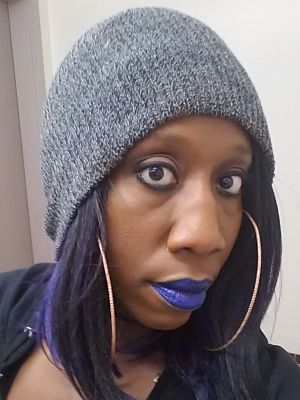Shields Up, Red Alert, Incoming Climate Change
I was raised by a Trekkie who had grown up watching The Original Series (TOS), seen all the movies, and Stans The Next Generation (TNG.) For the better part of ten years, I’ve been dating my Par’mach’ai (Klingon for romantic partner) who, when we decided to cohabitate without the formal legal and religious contract, asked if we could start watching Star Trek episodes together. Having never seen any as an adult I agreed, starting with TNG, then back to TOS, the Animated Series, and Deep Space Nine. We agreed the latter was our favorite, diving into alien life among the different species, encountering universal moral and ethical dilemmas in the process. In Deep Space Nine, the space station was always welcoming of new (non-hostile) lifeforms.
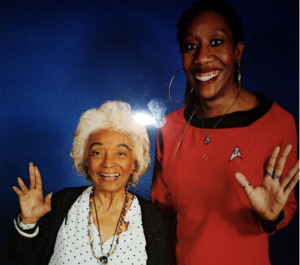 Over the summer, for the first time ever, I attended the Mount Everest of Nerd Culture: A Star Trek Convention, at the Rio in Las Vegas. With the exception of men, I couldn’t say I saw more of one demographic over the other and in its diversity, the convention reflected the principles of the Star Trek universe. The show’s creator, Gene Roddenberry, believed that humanity could evolve into greater things through intelligence and understanding. He believed our problems could be solved through reason and partnership, meaning that no specific gender race, creed, or nation was above or better than the other.
Over the summer, for the first time ever, I attended the Mount Everest of Nerd Culture: A Star Trek Convention, at the Rio in Las Vegas. With the exception of men, I couldn’t say I saw more of one demographic over the other and in its diversity, the convention reflected the principles of the Star Trek universe. The show’s creator, Gene Roddenberry, believed that humanity could evolve into greater things through intelligence and understanding. He believed our problems could be solved through reason and partnership, meaning that no specific gender race, creed, or nation was above or better than the other.
Roddenberry’s principles were evident as I paraded around in my Guian cosplay and listened to the panels on the ethics of Star Trek. The equal dignity and respect for every life form Roddenberry instilled were there as I grabbed a drink Quark’s Bar, chatting up with some fellow Uhura cosplayers. There was camaraderie during Klingon Karaoke when two cosplayers dressed up as the Klingon Duras sisters and belted out “Almost Paradise” entirely in the fictional language.
“A Library Serves No Purpose Unless Someone is Using It.”
In June, I attended a lecture for my MFA in creative writing titled: Ignoring the End of the World; Why We’re Not Writing about Global Warming, given by Sherman Apt Russell. She asked if any of us had written about climate change. No one raised their hand. She wanted to know why.
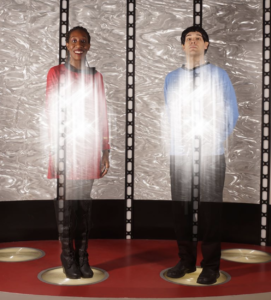 My thoughts went to a conversation I had with a former coworker. I told him my decision to move to San Diego from Missouri was solidified during the blisteringly cold and terrible winter. At noon that day, buckets of snow fell from the sky, turning into sheets of sleet before it touched the ground. It froze my windows and doors shut and I was trapped in my tiny duplex. I watched the news as the weather worsened; “Stay inside unless you have severed a limb,” the anchor said. Behind her, an emergency vehicle pulled another emergency vehicle out of frozen snow sandwiched between layers of ice. Then my manager called me to come to work. His boss, who lived a few hours away in a place that only got a few inches of snow, demanded we be open. I was living in a small college town and getting to work took all of fifteen minutes, with traffic. On that miserable day, it took me three hours and I was one of five employees that managed to make it there. I left Missouri that spring.
My thoughts went to a conversation I had with a former coworker. I told him my decision to move to San Diego from Missouri was solidified during the blisteringly cold and terrible winter. At noon that day, buckets of snow fell from the sky, turning into sheets of sleet before it touched the ground. It froze my windows and doors shut and I was trapped in my tiny duplex. I watched the news as the weather worsened; “Stay inside unless you have severed a limb,” the anchor said. Behind her, an emergency vehicle pulled another emergency vehicle out of frozen snow sandwiched between layers of ice. Then my manager called me to come to work. His boss, who lived a few hours away in a place that only got a few inches of snow, demanded we be open. I was living in a small college town and getting to work took all of fifteen minutes, with traffic. On that miserable day, it took me three hours and I was one of five employees that managed to make it there. I left Missouri that spring.
My coworker wasn’t impressed, rolling his eyes and sarcastically said “BuT gLoBaL wArMiNg,” which is what I told Russell. “People get caught up with the ‘warming’ part instead of looking at climate change as a whole. And they don’t realize it’s happening now.”
Russell asked for examples and I thought about how, just a month before while scrolling on Facebook, I saw friends post pictures of my hometown, Springfield, Missouri, overrun with floods. I was gobsmacked to see pictures of a bridge I used to pass every day on my way home covered in high waters. A Google search refreshed my memories of the many neighborhoods I lived during my formative years surrounded by rivers that had never been there.
Others gave their own anecdotes, agreeing that the assumptions and ignorance surrounding climate change was causing most to be blasé. Russell said that, as creatives, we should be using our platforms to bring awareness to environmental issues. She had my full attention. The last few years living in America have been trying to say the least, and I have felt I should be doing something. I can write my senators, I can protest, I can sign countless petitions, but I’ve had the itch to be doing something more and no amount of scratching has satisfied it. The itch deepened when I watched Hurricane Harvey decimate Texas and Louisiana, submerging large areas under water. That was one of the reasons why seeing my hometown flooded was so shocking; climate change is responsible for this, we’re seeing real-time factors play out exactly the way scientists said it would and yet there’s a loud minority insisting its a hoax. So the creatives get to creating worlds that are not illogical in their respective executions.
Comedy, satire, and speculative fiction are forms of entertainment but also serve as lenses into society. In my opinion, the latter is probably the most effective, with successful television series like The Twilight Zone and its spawn, Black Mirror, that acts as a warning for society when it gives into extremes. Climate-fiction, also called Cli-Fi for short, is a genre that is centuries old but wasn’t given a name until the late-2000s. Margaret Atwood wrote The Maddaddam Trilogy, beginning with Oryx and Crake and the dangers of genetic engineering with unchecked power.
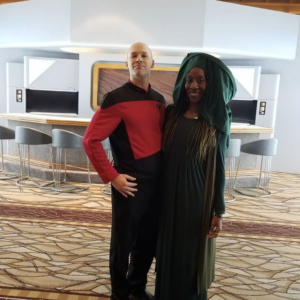 Russell’s lecture touched on this a bit and it made me realize that I’ve been a fan of Cli-Fi for as long as I can remember. The earliest film I saw that’s about climate change was Waterworld (1994) and then later as a teen, I watched Soylent Green (1973.) I saw A.I. (2001), The Day After Tomorrow (2004) and 2012 (2012) in theatres. I have a fascination with shows and media set in space as I love to see how others envision unknown worlds. The same could be said about Cli-Fi: I like the various interpretations of how the earth could be destroyed and of humanity’s attempts at a solution, like in Pandorium (2009), Sunshine (2007) and Snowpiercer (2013). Those worlds were enjoyable because I could get lost in the fantasy world. But as time passed and fantasy enmeshed with reality, I can no longer escape into these worlds, if only because it seems that everyone believes in science to help them.
Russell’s lecture touched on this a bit and it made me realize that I’ve been a fan of Cli-Fi for as long as I can remember. The earliest film I saw that’s about climate change was Waterworld (1994) and then later as a teen, I watched Soylent Green (1973.) I saw A.I. (2001), The Day After Tomorrow (2004) and 2012 (2012) in theatres. I have a fascination with shows and media set in space as I love to see how others envision unknown worlds. The same could be said about Cli-Fi: I like the various interpretations of how the earth could be destroyed and of humanity’s attempts at a solution, like in Pandorium (2009), Sunshine (2007) and Snowpiercer (2013). Those worlds were enjoyable because I could get lost in the fantasy world. But as time passed and fantasy enmeshed with reality, I can no longer escape into these worlds, if only because it seems that everyone believes in science to help them.
Whatever the reason, these creatives used their platforms to share a story with the world. Not everyone has that privilege and Russell was right; I should be utilizing what I had to bring awareness to a very pressing matter.
“Things are Only Impossible Until They’re Not.”
The Star Trek franchise addresses moral and ethical questions, usually when dealing with traditions among alien races. There have been several environmental episodes, but one Star Trek: Voyager episode stands out. In the episode ”Night,” Captain Janeway and crew are traveling on Voyager through total darkness they refer to as “The Void” located in the mostly unknown Delta Quadrant of space. The ship suffers a power outage caused by several alien intruders who are humanoids that look like oozing voids. Voyager is saved by another alien, Emck (who species is called Malon), and the crew also manages to catch one of the alien intruders. After the power is restored, they speak to the intruder in the ship’s medical bay as they realize it’s dying from theta radiation. The alien apologizes for the attack when it realizes Voyager is not a threat. It says its species initially attacked Voyager because he thought it was doing what Emck and the Malon were doing: dumping theta radiation into their space which is toxic to the species. Voyager’s Captain, Kathryn Janeway, provides a solution via Federation technology that turns the theta radiation into useful energy and matter. However, Emck rejects this environmentally friendly solution because the technology would kill his business as a waste dumper. He is incredulous that they would even suggest such a thing.
“Curious, How Often You Humans Manage to Obtain That Which You Do Not Want.”
On Earth, human activities are changing the natural greenhouse the Earth has which is causing global warming. Keep in mind that while individuals can do their part in helping, it’s the corporations that are doing the most damage. The fossil fuel industry has doubled its contribution to global warming by emitting as much greenhouse gas (GHS) in twenty-eight years as in the two hundred and thirty-seven years between 1988 and the birth of the industrial revolution. Since 1988, more than half of global industrial GHGs can be traced to just twenty-five corporate and state producers.
What’s worse is that there have been reports that these corporations knew about the effects their activities were causing climate change and ignored it. Shell and Exxon had their own internal studies that stated forecasted the detrimental global consequences of carbon dioxide released by fossil fuels. Those studies were done in the 1980s, buried by the company and not leaked until just a few years ago.
“Humans Do Have an Amazing Capacity for Believing What They Choose — and Excluding That Which is Painful.”
I wouldn’t be a Star Trek captain. Couldn’t really. I don’t have the diplomatic stature of Jean Luc Picard, I lack the dignified intimidation that Benjamin Sisko has, nor do I have Kathryn Janeway’s methodical brilliance. The superpower of these Star Trek captains was to be able to sympathize so as to understand alien life and customs, even when they disagreed with it.
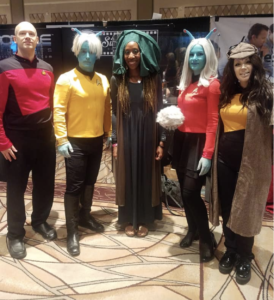 I, on the other hand, am more like a Klingon, aggressively incredulous that there are still people who deny climate change despite significant signs it’s happening: Hurricane Harvey and it’s catastrophic flooding, seventeen out of the last eighteen years have been the hottest on record with unprecedented droughts. The latter tremendously affects poverty-stricken regions like Southern Africa, where Cyclone Idai hit leaving thousands dead and many more without food, water, and shelter leading to sickness and disease. America is a rich country in comparison but victims of severe weather changes happen here as well. Look at how Katrina was handled. Look at the Houston floods. During my undergraduate studies, Sherri L. Smith, came to Antioch to discuss her experience when writing her book, Orleans. It’s a dystopian YA-novel set years after the United States secedes from the southern states after a series of hurricanes devastated those states, leading to an outbreak of diseases. We’re not so far removed from the catastrophic.
I, on the other hand, am more like a Klingon, aggressively incredulous that there are still people who deny climate change despite significant signs it’s happening: Hurricane Harvey and it’s catastrophic flooding, seventeen out of the last eighteen years have been the hottest on record with unprecedented droughts. The latter tremendously affects poverty-stricken regions like Southern Africa, where Cyclone Idai hit leaving thousands dead and many more without food, water, and shelter leading to sickness and disease. America is a rich country in comparison but victims of severe weather changes happen here as well. Look at how Katrina was handled. Look at the Houston floods. During my undergraduate studies, Sherri L. Smith, came to Antioch to discuss her experience when writing her book, Orleans. It’s a dystopian YA-novel set years after the United States secedes from the southern states after a series of hurricanes devastated those states, leading to an outbreak of diseases. We’re not so far removed from the catastrophic.
“One Man Cannot Summon the Future. But One Man Can Change the Present.”
Gene Roddenberry believed “co-operation and mutual encouragement” is how humanity achieved enlightenment, progressing enough to travel through the stars. He believed that this goal would be obtainable. One could argue that since Star Trek is set so far in the future, it is still a fantasy but in its universe, humans achieve warp drive in 2063, roughly 43 years from now. The Vulcans (the most famous one being Spock) made peaceful first contact with Earth on April 5th, 2063, congratulating humans on the global-changing accomplishment and inviting them to discover new worlds. The results were wonderful: humans don’t suffer from sickness, diseases, poverty, or even headaches. In Star Trek’s universe, our species’ ability to survive was indistinguishable from its ability to learn to cooperate. Simple to say, but it seems unlikely that it will ever actually happen in reality–maybe that’s what fantasy is for. Maybe fantasy can save us. Humans learn to trust one another because they discovered the universe is bigger than our solar system and they positively adapted to change. It’s not impossible; the Star Trek convention I attended was a taste of what could be: all creeds, all nations, all colors living and working together for the greater good.
“Look at these three words written larger than all the rest, and with a special pride never written before or since — tall words, proudly saying ‘We the people’ … these words and the words that follow … must apply to everyone or they mean nothing.” -James T. Kirk
*Special thanks to Sherman Apt Russell.
Stephanie Teasley is an Antioch University graduate student pursing her M.F.A. in Creative Writing. A transplant from the Midwest, she has found a great life surrounded by loved ones, both furry and human, in California. Her mixology skills as a bartender have transferred over to her writing, as she slings words around just as much as she does drinks. She enjoys being introverted but doesn’t mind great company.

